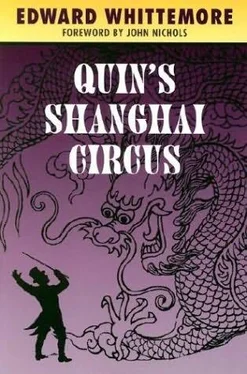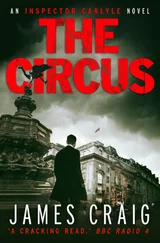Edward Whittemore - Quin’s Shanghai Circus
Здесь есть возможность читать онлайн «Edward Whittemore - Quin’s Shanghai Circus» весь текст электронной книги совершенно бесплатно (целиком полную версию без сокращений). В некоторых случаях можно слушать аудио, скачать через торрент в формате fb2 и присутствует краткое содержание. Жанр: Фэнтези, на английском языке. Описание произведения, (предисловие) а так же отзывы посетителей доступны на портале библиотеки ЛибКат.
- Название:Quin’s Shanghai Circus
- Автор:
- Жанр:
- Год:неизвестен
- ISBN:нет данных
- Рейтинг книги:3 / 5. Голосов: 1
-
Избранное:Добавить в избранное
- Отзывы:
-
Ваша оценка:
- 60
- 1
- 2
- 3
- 4
- 5
Quin’s Shanghai Circus: краткое содержание, описание и аннотация
Предлагаем к чтению аннотацию, описание, краткое содержание или предисловие (зависит от того, что написал сам автор книги «Quin’s Shanghai Circus»). Если вы не нашли необходимую информацию о книге — напишите в комментариях, мы постараемся отыскать её.
Quin’s Shanghai Circus — читать онлайн бесплатно полную книгу (весь текст) целиком
Ниже представлен текст книги, разбитый по страницам. Система сохранения места последней прочитанной страницы, позволяет с удобством читать онлайн бесплатно книгу «Quin’s Shanghai Circus», без необходимости каждый раз заново искать на чём Вы остановились. Поставьте закладку, и сможете в любой момент перейти на страницу, на которой закончили чтение.
Интервал:
Закладка:
The two of them, dressed as Chinese students, were driven in a closed van to an alley behind Bubbling Well Road. They entered a hallway guarded by Kempeitai agents disguised as shoemakers and took up their places in an abandoned storefront that faced the thoroughfare. Some twenty minutes later when the crowds were thickest, an elderly Japanese monk came into view.
The monk belonged to one of the most famous Japanese families living in China. His great-grandfather had emigrated to Canton at the beginning of the nineteenth century, studied acupuncture, and founded a hospital.
In 1840 the acupuncturist’s son joined the Chinese forces that were fighting the British to try to end the opium trade in that city. Two years later he was killed, one of the last patriots to fall before Britain annexed Hong Kong as a base for expanding its opium interests.
The patriot’s son became a Buddhist scholar in Nanking. The scholar’s son became a monk in Shanghai. On that winter afternoon in 1932 he was walking from his temple to his residence, following the route he had taken every day for fifty years.
When the elderly monk was abreast of them they burst out of the storefront shouting their slogans and firing their revolvers. A few minutes later they had raced back down the alley and were speeding away in their van.
The next day, in retaliation for the murder, a Japanese squadron bombed the Chinese slums in the city, the first time in history that bombing planes had been used against civilians. A Japanese naval garrison clashed with the Nineteenth Chinese Route Army and thus began what became known in Japan as the Shanghai Incident, one more reason for the Japanese invasion of north China a year later.
Just before they left Shanghai an older man in civilian clothes visited them in their apartment. He was furious with the Captain because the monk had been killed rather than wounded in the arm, which was what he had ordered them to do. The terrified Captain replied that it had been impossible to aim carefully. They had been running across the sidewalk and had only a few seconds in which to act.
The claim was true on the Captain’s part. Only one of his bullets had struck the monk, and that one in the arm. As for the policeman, he said nothing. He had purposely emptied his revolver into the monk’s chest, partly thinking the Captain would be blamed for it, his revenge for the time his comrades had betrayed him in Korea, partly because he was so excited to be on a crowded street with a loaded revolver he had to empty it into someone.
The policeman had expected the captain to be sentenced to three months of latrine duty, but the old man in civilian clothes simply turned away, tears in his eyes, and left.
The episode in the Shanghai apartment was one of three times the policeman was to see the older man over the next five years. The older man was unaware of the second encounter, for despite the precautions he took it was perhaps inevitable that at least once during his eight years of clandestine work he would be observed servicing a dead drop.
The third time, however, they came face to face and that was when the policeman killed him.
After the adventure in Shanghai the policeman’s duties in Mukden seemed routine and uninteresting. He still stole files for the Captain and occasionally served as an undercover agent in one of the restaurants where Japanese officers gathered, but most of the time he worked in the icy cellars beneath Kempeitai headquarters.
The Chinese and Japanese and Korean prisoners were always stripped naked before being sent to the cellars. The Manchurian winters were harsh, and often there was no need to beat a man for more than a day or two before he confessed to anything. Those already condemned to die wore the traditional straw hat covering the eyes that was also worn by mendicant Buddhist monks.
The suspects were chained to the wall with their arms and legs spread, hung high enough so that their toes just touched the floor. The policeman’s job was to keep the prisoner awake when the interrogating officer grew tired and went upstairs to perform the tea ceremony or practice flower arranging for an hour or two. Because the policeman had always been humiliated by the body hair inherited from his Ainu mother, he particularly enjoyed the nakedness of the prisoners.
He tried slaps, kicks, punches. He squeezed the eyeballs and stuffed oily rags into the mouth, pinching first one nostril and then the other. He used his blackjack to rap the kneecaps, the elbows, the teeth.
Many methods worked but by far the best was holding the prisoner’s testicles in his hand and tapping them with his blackjack. The dull sounds that came out of the man then were unlike any he had ever heard. Only once did he imagine he heard them elsewhere, during an unbearably hot Manchurian summer when he was sitting alone on the plains, bareheaded, dizzily pulling a cricket apart.
The second time he saw the older man from Shanghai was in the autumn of 1937, a few days before he was transferred to an infantry unit in central China. He was on duty in civilian clothes in a restaurant listening to conversations when the older man came in and sat down alone in a corner. Something in the way he moved his head confused the policeman. Curious, he got to his feet and went off to the toilet.
Ever since the months in the Korean latrines the policeman had been able to think more clearly when immersed in an atmosphere of dung and urine. They were not only the smells that reminded him to beware of betrayal, they also brought back an older memory, one of his earliest, the times as a boy when he had carried heavy buckets of nightsoil up the giant steps of the Tohoku toward the mulberry trees.
There were only two stalls, the policeman sat down in one. He was just beginning to feel comfortable with himself when someone entered the other stall and locked the door.
The policeman always had to have privacy in the toilet, otherwise he couldn’t concentrate and make the smells that pleased him. He climbed up on the seat to peek over the partition, thinking he might use his blackjack on the intruder, when he saw a hand go up under the lid of the water tank and place something there. The hand withdrew, the door was unlocked, the older man from the Shanghai apartment left the room. What did it mean?
He went into the other stall and found a small length of bamboo, sealed at both ends, wedged into a niche under the lid of the water tank. He opened the bamboo tube and took out a tiny film. What was it?
He replaced the device and wandered over beside the urinals. He knew he had discovered something but he didn’t know what it was. He bent to tie his shoelace. His hand strayed into the urinal and picked up the hard cake of deodorant lying there. The cake was green and looked like candy. Absentmindedly he bit into the crunchy nugget and chewed.
What had he witnessed just now?
Angered that he could not understand what had happened, angered as well by the indistinct passions aroused in him by the older man from Shanghai, the policeman took a long walk that night to the outskirts of the city. The next day an elderly woman was found beaten to death with a blunt instrument, probably made of leather, and sexually violated with an inhuman object, either the same instrument that had caused the death or one similar to it.
Rape with the instrument had occurred after death. The body had then been stripped and the head scalped. Small patches of hair from the head had been crudely attached to the chest and forearms and thighs, a larger amount to the nearly hairless pubic region.
This necrophiliac crime was similar in every respect to others that had gone unsolved in remote areas near Mukden over the last five years, or since the policeman had completed his tour of duty in the Korean latrines. The victims, always of advanced age, included both men and women. Sexual assault was limited to the anus.
Читать дальшеИнтервал:
Закладка:
Похожие книги на «Quin’s Shanghai Circus»
Представляем Вашему вниманию похожие книги на «Quin’s Shanghai Circus» списком для выбора. Мы отобрали схожую по названию и смыслу литературу в надежде предоставить читателям больше вариантов отыскать новые, интересные, ещё непрочитанные произведения.
Обсуждение, отзывы о книге «Quin’s Shanghai Circus» и просто собственные мнения читателей. Оставьте ваши комментарии, напишите, что Вы думаете о произведении, его смысле или главных героях. Укажите что конкретно понравилось, а что нет, и почему Вы так считаете.












